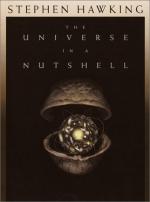
|
| Name: _________________________ | Period: ___________________ |
This test consists of 15 multiple choice questions and 5 short answer questions.
Multiple Choice Questions
1. According to Popper, what happens if positivism is true?
(a) We cannot believe in time.
(b) We cannot say what time is.
(c) We cannot say what space is.
(d) We lose all negativity.
2. What did Penrose and Hawking demonstrate concerning General Relativity?
(a) The universe will end with a massive explosion.
(b) The universe started with a tiny whirpool of light.
(c) The universe started with a massive explosion.
(d) The universe will collapse in a hundred years.
3. What did Einstein assume about scientific laws?
(a) Laws should remain constant in the view of all observers.
(b) Laws are never fallible.
(c) Laws are always fallible.
(d) Most laws need to be rewritten.
4. What is thought to expand at an accelerating rate in our universe?
(a) Reach.
(b) Scope.
(c) Matter.
(d) Light.
5. Dirac's discoveries were difficult to reconcile with what?
(a) Hawking's harangue on black hole theory.
(b) Popper's theory of demystification.
(c) Maxwell's unification of magnetism, energy, and electricity.
(d) Newton's law of gravity.
6. What does supersymmetry imply?
(a) That strings have a spin property.
(b) That gamma rays have a spin property.
(c) That particles had a spin property.
(d) That molecules have a spin property.
7. What is one reason Hawking takes multiple dimensions seriously?
(a) Conclusive relationships between plane models.
(b) Unexpected relationships between various string models.
(c) Unexpected relationships between multiple dimensions.
(d) Expected relationships between diverse string thories.
8. What did the philosopher Immanuel Kant worry about concerning time and Newton's model?
(a) This this implied time was finite.
(b) That Newton's model was too irrelevant.
(c) That this implied time was infinite.
(d) That Newton's model was disproportionate.
9. Who were unconvinced by the ideas of an infinite past and future?
(a) Popper and Newkowitz.
(b) Penrose and Hawking.
(c) Shalob and Khalatnikov.
(d) Lifshitz and Hawking.
10. Who believed they could interpret General Relativity so time had an infinite past and an infinite future?
(a) Hawking and Penrose.
(b) Lifshitz and Khalatnikov.
(c) Shalob and Khalatnikov.
(d) Lucas and Marx.
11. Because galaxies are not far apart, fifteen billion years ago what might have occurred?
(a) An earthquake.
(b) A light was turned on.
(c) A "Big Bang."
(d) A solar system was reduced to ten atoms.
12. What human conceptions did Einstein's papers change?
(a) Time, ciphers, and values.
(b) Love, warp speed, and imaginary time.
(c) Morals, virtues, and predilections.
(d) Space, time, and reality.
13. What does general relativity combine time with space to form?
(a) Three-dimensional physics.
(b) Four-dimensional space-time.
(c) Five-dimensional warp speed.
(d) Two-dimensional planes.
14. What do we need to describe what happens on the edge of the universe?
(a) Boundary conditions.
(b) Finite structures.
(c) Boundary laws.
(d) Limited perceptions.
15. What did Hubble find about collections of stars?
(a) Collections of stars always have two megastars.
(b) Black holes can be found within large collections of stars.
(c) They are sometimes red-shifted and blue-shifted.
(d) Super novas are common in collections of stars.
Short Answer Questions
1. How many galaxies are there?
2. How do objects in space-time attempt to move?
3. Why is it important that the sky is dark?
4. How did the universe initially expand?
5. Where did Einstein receive his degree?
|
This section contains 557 words (approx. 2 pages at 300 words per page) |

|




